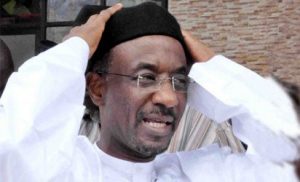Opinion: The Place of Sanusi’s Banishment In Nigeria Today – By OLUWASANMI FEMI

Amidst the shock, disappointment, commendations, condemnations that greeted the dethronement of Sanusi Lamido Sanusi as the Emir of Kano, one of the things that seems to be confusing is the place of the banishment, and detention of the Emir in Nigerian Constitution.
Shortly after the Emir, Sanusi II was dethroned on 9th March, 2020, the law enforcement agents whisked him to Abuja and later to a village in Nasarawa State where he is expected to live the rest of his life in exile based on the tradition.
The Secretary to the State Government, Alhaji Usman Alhaji, while announcing his dethronement, alleged that the Emir’s total disrespect to lawful instructions from the office of the state Governor, authorities: including his persistence refusal to attend official meetings and programmes organised by the Government without any justification and other activities which amount to the violation of part 3 section 13 (a-e) of the Kano state Emirate Law 2019 constituted greatly to his removal.
Meanwhile, one of the aids of the Governor, Salihu Yakasai, the Special Assistant to Governor Abdullahi Umar Ganduje on Media and Publicity, stated that the rift between Sanusi and the Governor started in 2017, when he publicly criticised the governor at an event in Kaduna on the issue of the proposed light rail project by the State government. Since then, the Emir and the Governor have been fighting a cold war.
Probably, this cold war was what led to the the reform of Kano State Emirate Law in 2019 which gives the governor power to remove any Emir and the division of the emirate into five with one portion of the five emirates given to Sanusi while the remaining four were given to the other newly appointed Emirs.
Though, the Governor claimed that the division and the amendment were done in order to bring development closer to the people just like he described the removal of the Emir as an effort to preserve the sanctity, culture, tradition and prestige of the Kano Emirate built over a thousand years ago, but the speed and the dimensions it took, left so much to be answered.
Barely 3 days after Sanusi’s removal, Alhaji Rabi’u Musa Kwankwaso, alleged that the Kano State government only acted the script written by President Mohammed Buhari though, Mallam Garba Shehu, presidential spokesman, said the President has no hand in the dethronement of Muhammadu Sanusi II as Emir of Kano.
While this might be true, the movement of such an important personality from Kano State to Nasarawa State cannot be done without the awareness of the President because the issue of security is on the exclusive list and by the constitutionally provision the Jurisdiction of Kano State governor does not extend to Nasarawa State.
Even if the President was not aware of the matters that to led to the dethronement of the Emir, what about the post development. Before the commencement of the Federal Executive Council meeting on 11th March, there was a closed door meeting between the Governor of Nasarawa State, Abdullahi Sule, and Mr President. Though, the content of the meeting were not disclosed, but it is expected that something related to the detention of the Emir in Nasarawa would formed parts of their talk.
Whereas, the section 35, 37, 41, of the 1999 Constitution of the Federal Republic of Nigeria as amended 2011, give every Nigerians right to personal liberty, right to private and family life, right to freedom of movement among others.
In order to ensure that these rights are not being jeopardize by the tradition or any by-laws, the section 1(3) of the constitution categorically stipulates that If any other law is inconsistent with the provisions of this Constitution, this Constitution shall prevail, and that other law shall, to the extent of the inconsistency, be void.
For proper interpretation of this section in time like this, the section 6 of the same constitution gave the Court the power to interpret the law and withdraw these rights where necessary. But, in Sanusi’s case it was another ball game entirely as no court of comptent jurisdiction has sat on his case since his dethronement not to talk of taking away these rights from him.
Though, It understandable that the appointment or removal of Emirs and other traditional leaders is strictly within the jurisdiction of State governments but it is unfair for the state government to assume the position of the judiciary by banishing or detaining a person within or outside its jurisdiction without obtaining court order.
Sanusi being a deposed Emir does not mean that he has lost these rights because he still remain a Nigeria and he is entitled to enjoy them till it is proven otherwise by the court of law.
So, If truely it is the same 1999 Constitution that gives the President, Vice President, Governor, Deputy Governor immunity in section 308 which is one of the reasons Governor Ganduje’s role in “Gandollar Saga” still remains silence till date, then Mallam Sanusi should be allowed to exercise his fundamental human rights.
Femi Oluwasanmi, a Public Affairs Analyst,
Ibafo,
Ogun State.
